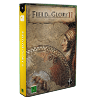If Infantry has often been called the “Queen of Battles”, Cavalry should have been declared “Infantry’s worst enemy”.
For centuries in Ancient Times, large cavalry formations constituted one of the most dangerous threats to professional and non-professional armies alike.
Ferocious and merciless, the semi-nomadic peoples of Ancient Times were led by powerful chiefs and kings, the most feared among them listed amongst the world’s greatest conquerors.
Will your destiny be “to crush your enemies, see them driven before you, and to hear the lamentations of their women”?
We are pleased to announce another Field of Glory 2 public tournament. This will be played using the normal Field of Glory 2 Multiplayer system and our automated tournament system.
IMPORTANT!
Anyone who has Field of Glory II can enter. You do not need to own any DLCs to enter.
To enter, go to the tournament page here:
http://www.slitherine.com/tournaments/tournaments.asp
The general tournament rules can be found here:
http://www.slitherine.com/tournaments/rules.asp?aPage=1&filterStatus=
The first round will commence on Tuesday 12th February 2019 at 10.00 am GMT. No further entries can be accepted after the tournament has begun.
Specific tournament rules:
This tournament will involve three rounds. The battles will be medium-sized custom battles. Note that the Parthian, Sassanid and Kushan lists were all given a significant makeover in the v1.4.7 patch.
Round 1: 167 BC. Parthian invasion of Graeco-Bactrian Kingdom. Parthian (250 BC-225 AD) vs Graeco-Bactria (250-130 BC). Middle-Eastern Agricultural.
Round 2: 225 AD. Sassanid invasion of Kushan Empire. Sassanid Persian (224-349 AD) vs Kushan (130 BC-476 AD). Middle-Eastern Agricultural.
Round 3: 582 AD. Avar invasion of the Balkans. Avar (558-631 AD) vs Byzantine (579-599 AD). Mediterranean Agricultural.
Games are paired, so each matchup will be played both ways. Each player will be able to choose his forces using the normal force selection system. In each round, all players will be playing on the same randomly generated map for both games.
First round pairings will be selected randomly, subsequent rounds using the Swiss Chess system. Nobody will play the same opponent in more than one round.
The scoring system is as follows:
· If a game runs to the turn limit, each side scores points equal to the enemy % routed at the turn limit. If the game times out, adjustments may be made, depending on how far the game has progressed and who took longer over their turns – see below.
· If one army breaks, the victorious player scores 60 points plus the difference between the enemy % routed and his own % routed. The loser scores points equal to the winner's % routed.
Examples:
1) If Ben defeats Tamas's army, and has inflicted 45% routed on Tamas, and Tamas has inflicted 15% on Ben, Ben will score 60 + (45 – 15) = 90, Tamas will score 15.
2) However, if Ben defeated Tamas’s army by inflicting 62% routed on Tamas, and Tamas had inflicted 56% routed on Ben, Ben would get 60 + (62 – 56) = 66 points, and Tamas would get 56.
3) If the game is unfinished (or it reached the turn limit) with Ben inflicting 20% routed on Tamas, and Tamas inflicting 10% routed on Ben, Ben would score 20, and Tamas would score 10. (Provided that between them they have played at least 24 turns in all – see below).
Note that this system rewards aggressive play over desultory skirmishing. If you rout an enemy unit then hide for the rest of the game, both players will get extremely low scores - lower than if they played hard and lost.
Byes:
If an odd number of players sign up for the tournament, one player will get a bye in each round. In the first round this is random. In subsequent rounds it will be the player with the lowest score. The score for a BYE is 75 points for each game.
Round times and timing out:
Each round will last 14 days.
Any battles that are not completed by the end of the round will be timed out. The player who has had the game in his “My Turns” box the longest overall will be the one who is deemed to be timed out. This will not normally incur any penalties, unless insufficient turns have been played: If the timed-out player has played less than 12 turns, his score will be reduced proportionately, and his opponent will be granted the BYE score if it exceeds his current score. If the timed-out player has played less than 6 turns, he will not be included in the draw for the next round. This is to prevent someone else’s enjoyment being spoiled by being drawn against someone who has apparently dropped out of the tournament.



 Cart (0)
Cart (0)
